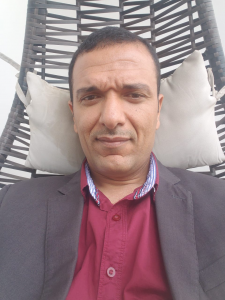This is the third in a series of posts where alumni tell us about their experiences studying at HCRI and their life and work following graduation.
This post was written by Marwan Taher, who graduated with an MSc in Humanitarian Practice in 2023. He describes his work with the medical humanitarian organisation Médecins Sans Frontières and the transformative role of study to his career. Thank you for sharing your insights Marwan!
I am Marwan Taher, a Yemeni humanitarian worker deeply committed to improving public health in developing countries. My journey began as a dentist, where I practiced clinically for approximately eight years. However, in 2012, my passion for humanitarian work led me to shift careers. Since then, I have had the privilege of working primarily with Médecins Sans Frontières (MSF), an organization renowned for its medical and emergency response efforts.
Pursuing a master’s degree in Humanitarian Practice at the Humanitarian and Conflict Response Institute (HCRI) at the University of Manchester played a pivotal role in shaping my career. This education allowed me to fulfil my dream of becoming an international staff member within MSF and taking on leadership roles in the field.
My time at HCRI was transformative. It provided me with a deep understanding of humanitarian history, including how previous generations overcame key challenges in their missions. This knowledge now informs the decisions we make on the ground. Additionally, I gained valuable skills in conducting health research and critically analysing outcomes. I also learned how to negotiate effectively in humanitarian settings, understand management styles and leadership approaches specific to humanitarian contexts, and navigate disasters and fluid environments.
After completing my degree, I applied to join MSF’s international team. Following an extensive screening process involving technical, professional, and personality assessments, I was validated for the role of Field/Project Coordinator. Since then, I have worked in challenging environments such as Cameroon, Myanmar, and Sudan, gaining substantial experience in these contexts. In February 2024, I was selected to join MSF’s Emergency Pool as a Project Coordinator. My experiences at HCRI have been instrumental in preparing me for these demanding leadership roles.
A typical day or week in the role of an MSF Project Coordinator involves overseeing the coordination of various departments—logistics, medical, human resources, and finance—to ensure the smooth operation of field projects. The day usually begins with team meetings to assess ongoing activities, identify emerging needs, and prioritize actions. Engaging with national authorities, civil society, and the media is a key part of ensuring that MSF’s projects are integrated into the local context while staying aligned with the organization’s mission.
Throughout the week, I monitor the political and humanitarian situation, propose medical and operational strategies, manage security for the project, and represent MSF in external meetings. Managing resources, fostering team collaboration, and adhering to MSF protocols, particularly in crisis situations, are central to my role.
Crucial Skills for Professionals in This Field
- Leadership and Team Management: Leading multidisciplinary and multicultural teams is essential to ensure that everyone works effectively toward the project’s objectives.
- Adaptability: The ability to adjust quickly to different cultural, political, and humanitarian environments is crucial, especially when working in diverse and challenging contexts.
- Communication Skills: Strong interpersonal skills are necessary for engaging with local authorities, media, and organizations, as well as ensuring clear communication within the team.
- Problem-Solving and Decision-Making: Being able to assess situations rapidly and respond to crises, often with limited resources, is key to the role.
Challenges and Rewards
One of the main challenges is managing stress while working in unstable or high-risk environments where crises can emerge unexpectedly. Balancing the needs of the project with limited resources in remote or conflict-affected regions is often demanding. Ensuring the safety of the team and maintaining MSF’s mission in politically sensitive situations further adds to the complexity.
Despite these challenges, the role is highly rewarding. The ability to make a tangible impact on communities in crisis, to provide life-saving medical care, and to witness real change brings immense satisfaction. Moreover, working with a dedicated team that shares a deep commitment to humanitarian values is a source of personal and professional fulfilment.
My advice to current HCRI students is to be proactive and flexible in your approach to entering the humanitarian field:
- Build Your Network Early: The humanitarian sector thrives on connections and relationships. Start networking with professionals in the field, attend conferences, and engage with alumni. LinkedIn is a great tool, but don’t underestimate the value of personal connections made during internships or volunteer work.
- Gain Field Experience: Practical experience is crucial. Whether through internships, volunteering, or short-term contracts, getting on-the-ground expertise will strengthen your CV and help you understand the realities of working in crisis situations. Even smaller or local organizations can provide valuable insights and skills.
- Be Open to Different Roles and Contexts: The humanitarian sector is vast, with roles in project coordination, research, advocacy, and more. Be flexible in your job search and willing to work in diverse and challenging environments. Starting with a less senior role in a difficult setting could provide you with faster career progression.
- Stay Committed and Patient: The job market in the humanitarian field can be competitive, and it may take time to land the right position. Stay persistent, keep learning, and take every opportunity to grow your expertise. Flexibility and perseverance are essential qualities that will eventually lead to success.
For info on courses at HCRI, visit: https://www.hcri.manchester.ac.uk/study/courses/
To view our Careers Guide, visit: https://www.hcri.manchester.ac.uk/study/careers-and-employability/
END

